 Candywood Golf Club is a public course just across the Ohio border from Sharon, PA in a town called Vienna. The region boasts a lot of fine, affordable golf courses ranging from Tam O’Shanter to Yankee Run and Oak Tree Country Club (reviewed here).
Candywood Golf Club is a public course just across the Ohio border from Sharon, PA in a town called Vienna. The region boasts a lot of fine, affordable golf courses ranging from Tam O’Shanter to Yankee Run and Oak Tree Country Club (reviewed here).
Director of Golf Barry Good invited The Sand Trap to play a round at his course, and we readily accepted. He described the course as “a good mixture of open and tighter holes of varying length and difficulty.” He also said that the greens were some of the best in the area.
Staff member Dave Koster’s father Ed and I played Candywood in mid-May, just as the trees were beginning to blossom and sprout leaves. What began as a cloudy day ended up turning into a perfect afternoon: blue skies salted with clouds and peppered with a slight breeze that kept things cool and proper club selection an important factor.
Conditions
For $29, Ed and I were not expecting the best conditions. What we found surprised us tremendously.
Candywood must have a genius or two working out of the maintenance shed, because the conditions were quite good. Tee boxes were flat and lacked the severe damage and stress you’ll find at most public courses. The gently rolling fairways were lush and thick. The rough, too, was thick and healthy, even in areas with a lot of trees where one would expect shadowy conditions to foster poor turf conditions.
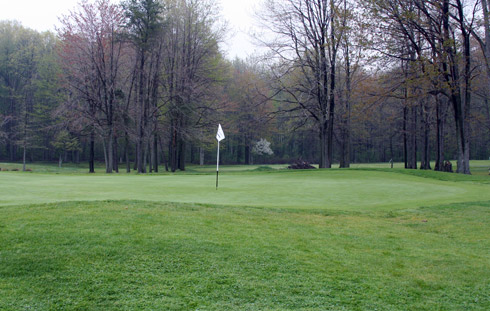
The second green features gentle mounding that influence the slopes on the green in subtle fashion.
The greens were some of the best we’ve ever played on, and as a retiree, Ed has played his fair share of courses. Thought they would have stimped at only about 10 feet, they were smooth as glass and deceptive to putt. Very few ballmarks marred the surface, and the fringe and surrounding grass was consistent. We can’t say too much about the greens, so we’ll content ourselves by reiterating what we’ve said already: they were some of the best we’ve ever seen.
Even the various water hazards, flower beds, and bridges were kept well. Though we could probably have found an occasional flaw if we looked hard enough, we were unable to see many problems at all in a round of golf, and are confident that any trouble spots on the course would do little to change our mind, as every course has the occasional spot of trouble.
All around, the conditions were stupendous, and Ed and I were more than pleased.
Design
I’m not entirely sure who designed Candywood, but my guess would be an amateur architect or someone just starting out. Like most public courses, Candywood didn’t have the budget to hire Tom Fazio or Rees Jones to do their routing. And, while it’s obvious this isn’t a $10M design, the course has something the bigger-name courses don’t have: a unique and personal charm.
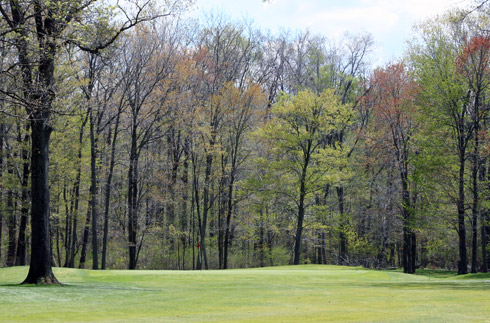
The tee shot to the 341-yard 16th had better find a good spot or trees will block your approach to the green. Here, you can just make out the red flag in the middle of the green.
From the blue tees, the twelve par fours range from 327 to 451 yards and bend both left and right. Most of them fall around 400 yards, providing a stern test for the average golfer. The three par threes measure 167, 195, and 198 yards. I found myself wishing for a bit more variety in these holes, but that was not a problem with the three par fives. They measured 488, 508, and 532.
Candywood mixes some interesting holes with others that are quite bland. The par threes are all rather bland and play to rather square- or oval-shaped greens sloped back to front. Two of the three will likely be played with the same club, and none bring water into play.
The par fives are a good bit more interesting. The fifth is a 488-yard par 5 with water from 100 to 30 yards short of the green. A good drive provides a good risk/reward option to average to longer hitters. The 15th is a gentle dogleg right measuring 532 yards with a lot of trouble to the right. The tee shot was one of the most visually appealing of the day.
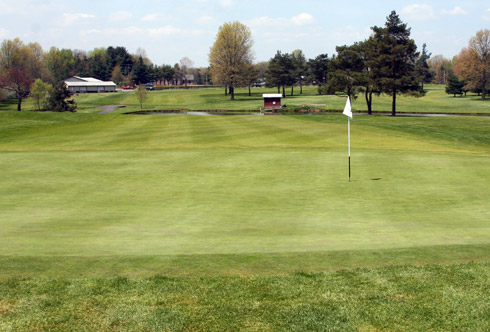
The tenth, seen from behind the green, is one of those “goofy” 90° holes that can be reached in two by flying over the corner with a long iron or fairway wood.
The 508-yard tenth is perhaps the weakest of the trio, playing 508 yards but reachable with a pair of 3-irons. You see, it’s one of those “90° holes” where you drive with a mid-iron to a fairway, cross a pond with your second shot, and then hit a wedge approach. Or, you do as I did: cut the corner to just short of the pond and hit a three iron to the green. I didn’t see much risk in cutting the corner, but should a few more trees sprout up, the hole will become much more difficult.
Candywood relies on its twelve par fours. Though many are rather straight and play as driver/short-iron holes, many require you to work the ball off the tee or know your precise carry distances for your woods to get into optimal position. Routed through trees and around a series of lakes and streams, nearly every par fours demands accuracy with either the drive or the approach.
For example, the 403-yard seventh requires a delicate cut around the corner of a dogleg or a 3-wood from the tee. Built in 1967, the course likely didn’t require such a shaped shot originally, but as the average amateur drives the ball just a bit further, shot shaping and smart play have come into play as necessary ingredients.
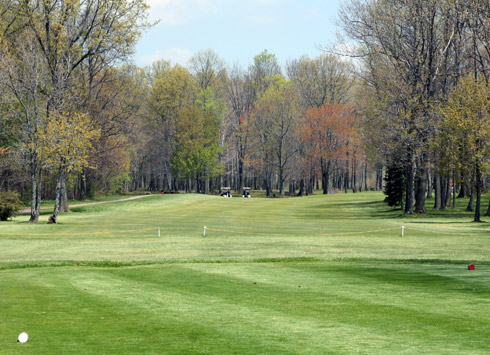
A straight drive on the 377-yard twelfth will run out of room, but one aimed at the carts with a precise cut will reward the player with a short-iron approach.
The 327-yard 13th hole is another great short par four that requires nothing more than a 3-wood fitted into a rather tight fairway framed on both sides by trees. It may be reachable, but a very precise, long cut is required, and nothing stands to be gained by the brave but mildly errant. This hole is mirrored by the 341-yard 16th, which again asks for a precise 3-wood from the tee before players approach a green guarded on the left by large trees.
Candywood’s greens feature both subtle slopes and larger slopes. I somehow managed to leave myself 100 feet for birdie on the 198-yard par three 14th (I putted to tap-in range), so that tells you how large the greens can be. Finding the right portion of the greens is important, and players driving the ball well should be able to do so with short iron approaches most of the day.
Candywood features not a single sand bunker, and you’d be hard pressed to call any of the greenside features “grass bunkers” too. Instead, Candywood relies on a good mix of driving accuracy, approach shot placement, and subtle, tricky putting surfaces to protect Old Man Par. This course doesn’t reward the bold play very often, but it does reward the smart play and golfers who know their game.
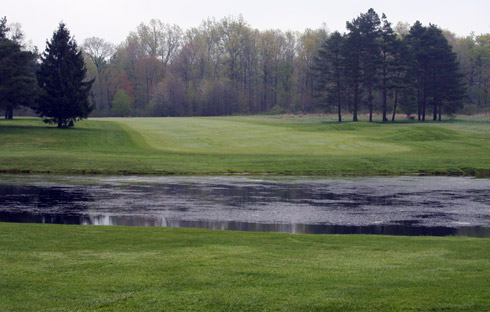
Looking back from the green on the 401-yard third hole, I cut the corner nicely and had only a wedge to the green. The water, for most golfers, will not come into play.
Value
Candywood costs $29 during the week ($26 for seniors) and $35 and $29 on weekends, including carts. The course, like most designed before golf course housing developments came into fashion, is rather easily walked.
For $22 (walking rate), Ed and I were hard pressed to think of any golf course which presents a greater value than Candywood. Even their large grillroom/restaurant menu offered great values ($12.95 for a 16 oz. prime rib!).
Candywood is tucked a little out of the way from a larger city or town, so perhaps that helps to explain the rather low cost. With great greens and course conditions, adequate design, and a friendly staff, Candywood rates very high in value.

Conclusion
Easily accessed from Ohio Route 11, Candywood is at 765 Scoville-North Road, 44473. You can set up a tee time of your own at (330) 399-4217. Though the design suffered from blandness in spots, players who think their way around this golf course will be rewarded. Even those playing poorly can appreciate the exceptional course conditions and tremendous value: not many courses in the world offer this level of “bang for the buck.”
Scorecard
Hole 1 2 3 4 5 6 7 8 9 Out Par 4 3 4 4 5 4 4 4 4 36 Blue 451 167 401 373 488 375 403 379 437 3474 White 398 128 387 355 473 375 379 346 373 3214 Hdcp 10 12 18 6 2 8 16 4 14
Hole 10 11 12 13 14 15 16 17 18 In Par 5 3 4 4 3 5 4 4 4 36 Blue 508 195 377 327 198 532 341 397 349 3224 White 474 153 359 302 168 505 327 339 320 2947 Hdcp 3 13 11 7 17 1 5 15 9
Totals Blue 71.4 116 6,698 yards White 68.9 110 6,161 yards Gold 69.0 107 5,397 yards Red 69.0 107 5,196 yards
Photo Credits: © 2006 Erik J. Barzeski, The Sand Trap. All rights Reserved.

I work in the maintenance department. This in fact my favorite course in the area and its not because I work there its because of the condition of the course and how it compairs to the condition of the big buck courses.